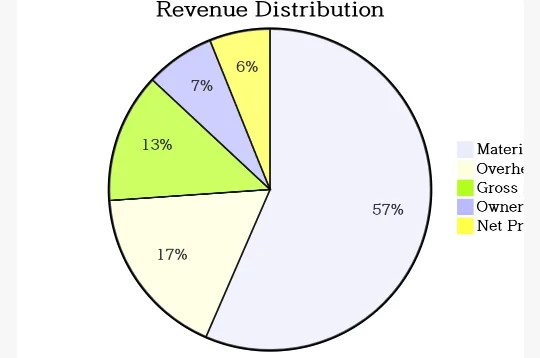We reached out to industry experts to reveal everything about starting a construction company with no experience. At first, it does not seem like this is possible but with a few tweaks, you can make it happen. Don’t be too happy yet – you still have work to do to survive in this competitive industry.
Ideally, you’d have to acquire comprehensive knowledge and expertise in the construction field. You can work under someone already established in the sector. This will enable you to understand the intricacies of running a business, pricing projects, and managing staff, along with the required construction techniques and material selection.
Since you know your target, immerse yourself in learning various trades as it can help you save money in the future by reducing your dependency on hiring outside help. Unfortunately, this learning process won’t be a quick one, so you have to dedicate at least a decade to it, absorbing all the insights and practical knowledge you can.
On top of that, keep in mind that starting a business, especially a construction company, requires significant financial investment. Chances are, you may encounter losses in your initial project, hence, save as much as you can during your learning period.
From industry experience, it can be tough. Some invest their life savings but lacked enough focus on the business aspects, resulting in a harsh setback. The recovery may even take up to three grueling years, so tread cautiously.
And just before we skip into the main thing, don’t underestimate the “power of networking” – know this now. You need to know a diverse range of tradesmen. Take a step back, reflect, and ensure you’re fully prepared before you plunge into starting a construction company. It’s a high-risk venture, and without careful planning, you might end up losing more than you bargained for.
- Learn about construction by working under an industry expert.
- Save and invest significantly as initial projects may incur losses.
- Establish connections with diverse tradesmen before starting.
- Create a comprehensive plan covering all aspects of your business.
- Register your business, obtain necessary licenses, and ensure proper insurance.
Are Construction Companies Hard to Start?
Consider the following table which breaks down some of these factors:
| Market Conditions | You’ll need to study the construction market to understand demand, competition, and potential opportunities. The harder the competition, the more difficult it can be to enter the market. |
| Regulatory Requirements | Construction is a heavily regulated industry, and complying with building codes, safety regulations, and licensing requirements can be complex and time-consuming. |
| Availability of Resources | Having access to skilled labor, materials, and financing is critical. Difficulty in obtaining any of these can hinder the startup process. |
| Business Management Skills | The owner’s business acumen will significantly impact the company’s success. Inexperience in areas like contract negotiation, cost estimation, or project management can make starting a construction company more difficult. |
Let’s make a hypothetical case:
If the market is saturated with competition and the economic conditions are unfavorable, then starting a construction company would be extremely difficult.
Similarly, if regulations are strict and difficult to navigate, or if resources like skilled labor and materials are scarce, the startup process will be more challenging.
On the other hand, if there’s a high demand for construction services, with few competitors, and you have access to resources and a strong understanding of business management, then starting a construction company with no experience might be less challenging.
Starting a Construction Company with No Experience – Step by Step

1. Develop a Business Plan
Every successful business starts with a well-thought-out business plan. This document serves as a roadmap for your business’s future growth and success. When developing a business plan for your construction company, consider the following elements:
- Executive Summary. This section provides an overview of your business, including what it will do and how it will make a profit.
- Company Description. Here, describe the type of construction work your company will specialize in.
- Market Analysis. Analyze your competition and your target market.
- Organization and Management. Describe your business structure and the team you’ll need.
- Services or Product Line. Detail the services you will provide.
- Marketing and Sales. Explain your strategies for attracting and retaining clients.
- Financial Projections. Estimate your revenue and expenses for the next three to five years.
2. Learn the Industry
Even though you’re starting a construction business with no experience, it’s crucial to familiarize yourself with the industry. You can do this by:
- Taking construction management courses online or at a local community college.
- Working or volunteering at a construction company to gain hands-on experience.
- Networking with experienced professionals in the construction industry.
- Joining industry-specific organizations for educational resources and networking opportunities.
3. Legalize Your Business
Legalizing your business to starting a construction company with no experience will ideally involve several steps.
You need to pick a business name, making sure the name you choose is unique and reflects the services you offer. And then register your business with the local, state, and federal government.
You would also need Federal and State Tax IDs. So, apply for an Employer Identification Number (EIN) from the IRS and any state tax IDs you may need.
Depending on your city, necessary licenses and permits are needed for your type of construction work. Check with your local government agency.
And don’t forget insurance. Construction is a high-risk industry, so you need the right insurance to protect your business and employees.
4. Secure Financing
Here are some ways you can secure financing because a construction company requires high upfront capital:
- Personal Savings. If you have enough savings, you can bootstrap your business.
- Bank Loans. You can apply for a small business loan from a bank.
- Private Investors. You can seek investment from angel investors or venture capitalists.
- Crowdfunding. You can use crowdfunding platforms to raise funds.
- Grants. Some governments and organizations offer grants to small businesses.
5. Assemble Your Team
Once you have the financing in place, it’s time to assemble your team. You will need skilled tradespeople who will carry out the construction work. A project manager, a person who oversees each project is also needed on board to ensure it’s completed on time and within budget.
Don’t leave out an accountant for handling your business’s financials, including tax filing. And lastly, a sales and marketing team that will work to attract and retain clients.
Note that the success of your business depends on your ability to attract and retain clients. Some marketing strategies you can use include:
- Attending industry events and joining local business groups to connect with potential clients.
- Using social media platforms to promote your services and engage with potential clients.
- Optimizing your website to rank higher in search engine results.
- Regularly publishing helpful and relevant content on your blog to attract potential clients.
- Use email marketing to keep your clients updated about your services.
6. Deliver Quality Work
While starting a construction company with no experience, you must endeavor to grow your construction business. And that means delivering quality work that exceeds your client’s expectations. This will result in repeat business and referrals.
You would also have to implement effective project management – it is critical to ensure projects are completed on time, within budget, and to client specifications.
Even without experience, you can become proficient at project management through online courses, professional certification programs, and by using project management software.
A good project management system will help you plan, coordinate, and control the project from inception to completion. You’ll need to understand aspects such as cost estimating, budget management, how to create a schedule, risk management, and quality control. With these tools at your disposal, you’ll enhance your construction company’s productivity, efficiency, and reputation.
7. Embrace Technology
Technology is reshaping the construction industry. From construction management software to drones for surveying job sites, technology can significantly boost your efficiency and accuracy.
Start by researching and investing in construction-specific software like CAD (Computer-Aided Design) for designing, project management software for tracking project progress, and accounting software for managing your finances. Also, consider new construction technologies, like building information modeling (BIM) and 3D printing. Embracing technology will not only streamline your operations but also give you a competitive edge in the market.
8. Prioritize Work Safety
Safety is paramount in the construction industry. Accidents on the construction site can lead to serious injuries, legal issues, and financial losses. Therefore, it’s essential to establish a strong safety culture right from the start.
This typically involves creating a comprehensive safety program, providing safety training to your employees, and ensuring compliance with all safety regulations.
You may also want to appoint a safety officer to oversee and enforce safety policies. A strong safety record can also be a unique selling point when bidding for projects and negotiating contracts.
9. Develop a Growth Strategy
As your construction company begins to establish itself, you should start thinking about your growth strategy. This could involve expanding your services, targeting new markets, or even partnering with other companies. When developing your growth strategy, consider your company’s strengths, the opportunities available in the market, and the resources you have at your disposal. Always align your growth strategy with your overall business goals and periodically review and adjust it as necessary. A well-planned growth strategy will ensure your business continues to grow and thrive in the long run.
Meanwhile, we’ve explained how you can get a construction project, even as a beginner.
Along the line, cultivate strong relationships. Building strong relationships with everyone you interact with – be it your clients, suppliers, employees, or even competitors – can go a long way in ensuring the success of your construction business.
You want to foster relationships with clients by providing excellent customer service, maintaining open lines of communication, and going the extra mile to meet their needs. Cultivate good relationships with suppliers to ensure you get the best prices and timely delivery. Treat your employees well to boost their morale and productivity.
10. Invest in Quality Tools and Equipment
The right tools and equipment can make a significant difference in the quality of work your construction company delivers. Here are some considerations:
- Quality over Quantity: Always prioritize quality over quantity when purchasing tools and equipment. High-quality equipment may be more expensive initially, but they will last longer and perform better.
- Maintenance. Regular maintenance of your tools and equipment is crucial to ensure they function optimally and have a longer lifespan.
- Upgrades. Stay updated with the latest industry trends and upgrade your tools and equipment as necessary.
11. Diversify Your Services
Diversifying your services can help you reach a broader customer base and increase your revenue. Consider market research to identify gaps you can fill. Are there services clients need that other construction companies don’t offer?
Also, training is important. When you invest in training for your team, it equips them with the skills necessary to offer new services.
For services you do not offer, you can partner with other businesses to provide complementary services – that’s generally how even top construction companies operate.
12. Establish a Strong Online Presence
You need an online presence – a strong one at that. It is necessary for your business, especially because your construction company is one without experience, and therefore not really known. That’s not to say that established construction companies do not continuously publicize their services online.
Here’s how you can do this:
- Website. Your website is the first impression many potential clients will have of your business. Make sure it’s professionally designed, easy to navigate, and showcases your services and previous work.
- Social Media. Use social media platforms to engage with your audience, showcase your work, and share industry news and insights.
- Online Directories. List your business on online directories to improve your visibility.
13. Continuous Learning and Improvement
In the construction industry, things change rapidly. New techniques, materials, and regulations emerge frequently. Here’s how you can ensure continuous learning and improvement:
- Industry News: Stay updated with the latest industry news and trends.
- Continuous Training: Regularly invest in training for you and your team to learn new skills and improve existing ones.
- Feedback: Seek feedback from your clients, employees, and partners to identify areas for improvement.
14. Foster a Positive Company Culture
A positive company culture is vital for attracting and retaining top talent, boosting productivity, and enhancing your company’s reputation. You can foster a positive culture by ensuring that everyone in the company understands and shares the company’s vision.
Also, treat everyone in the company with respect and fairness and encourage open and honest communication at all levels. As most businesses do, you can introduce recognition and rewards for employees to encourage their hard work and contributions.
15. Understand Your Competition and Stay Sustainable
Knowing your competition is key to carving out your unique place in the construction industry. Here’s how to get a handle on it:
- Identify your major competitors and research their business models, strategies, strengths, and weaknesses.
- Use this information to establish a competitive advantage. What can you offer that your competitors don’t? This could be anything from exceptional customer service to innovative construction methods.
- Keep track of your competitors’ activities. Have they adopted new techniques? Have they entered new markets? Use this information to continually adjust and refine your strategies.
More and more businesses are recognizing the importance of sustainability, and the construction industry is no exception. You can create a more sustainable business by adopting environmentally friendly construction practices, such as using sustainable materials and minimizing waste.
Also, strive to make your construction projects as energy-efficient as possible. This could involve everything from installing solar panels to using energy-efficient appliances. Remember to educate your clients and employees about the benefits of sustainable construction.
16. Develop a Robust Bidding Strategy
Bidding is the part of the construction industry where you get to make money. When starting a construction company with no experience, you need to develop a robust bidding strategy. Per construction industry experts, you need to master the art of cost estimation. You don’t want to underestimate, which can lead to losses. On the other hand, overestimating can cost you the job.
You can’t be a Jack of all trades, so be selective about the jobs you bid on. Focus on projects that align with your skills, resources, and business goals. And concerning presentation, your bid should be professionally presented and clearly outline the costs, timeline, and scope of the work.
17. Keep Up with Legal and Regulatory Changes
The construction industry is heavily regulated, and failing to comply with these regulations can lead to hefty fines or even closure of your business. But even that does not make it difficult to keep up with legal and regulatory changes.
It’s simple – regularly check local, state, and federal government websites for updates on regulations. Consider legal assistance, such as hiring a lawyer who specializes in construction law to help you navigate complex legal issues. It will also help to train your team and keep them updated on the latest safety regulations and building codes.
18. Prioritize Customer Service
Exceptional customer service can set your construction company apart from the competition. Here’s how you can prioritize customer service:
- Communicate clearly and frequently with your clients. Keep them updated on the progress of the project, and be available to answer their questions and concerns.
- Always strive to exceed your clients’ expectations. Deliver quality work and complete projects on time and within budget.
- Provide excellent post-construction service. This could include following up to see if the client is satisfied, providing warranties, and offering maintenance services.
Take These Aspects Seriously
Choosing a Specialization
Construction covers many areas. When starting, you may want to focus on a niche to be known for. Here are a few:
| Niche Area | |
|---|---|
| Road Construction | Building local highways |
| Bridge Construction | Constructing river bridges |
| Dam Construction | Creating reservoir dams |
| Airports and Helipads Construction | Building small airport |
| Seaports Construction | Constructing harbor docks |
| Skyscrapers Construction | Creating city high-rises |
| Public Facility Construction | Building hospitals or schools |
| Residential Facilities Construction | Building housing estates |
| Property Makeover Services | Renovating old buildings |
| Construction Consultancy and Advisory Services | Providing expert advice |
Necessary Equipment
You’ll need various heavy-duty machines for construction. This includes concrete mixers, cranes, forklifts, and more.
Installing Required Software
Engineering software like CAD and Auto Cad will be necessary. Also consider administrative software like payroll and accounting systems.
Hiring Your Team
Your company will need a skilled team. Here are some key roles:
| Job Role | |
|---|---|
| CEO | Overall company management |
| Project Manager | Handling project operations |
| Civil Engineer | Overseeing technical work |
| Structural Engineer | Checking building stability |
| Quantity Surveyor | Managing costs and contracts |
| Land Surveyor | Surveying construction sites |
| Company Lawyer | Handling legal issues |
| HR Manager | Managing company personnel |
| Business Developer | Driving company growth |
| Accountant | Handling company finances |
| Front Desk Officer | Attending to visitors and inquiries |
You’ll also need construction workers. Usually, construction companies hire these workers on a contract basis.
Facility
You’ll need an office for your operations. If you have the funds, you can lease a facility. If not, renting is also a good option.
As a starting point, you’ll probably need about a dozen full-time employees. Also, remember to provide for casual or contract workers as needed.
What if You Have No Money?
In the case where you are starting a construction company with no experience and no money, consider these sources of funding:
Partnerships
You could form an alliance with a person or an entity that has the necessary financial resources but lacks the technical expertise that you bring to the table. In this partnership, your skills and experience act as your capital.
The key to a successful partnership is establishing a clear understanding of roles, responsibilities, and profit sharing.
Each party should understand what they are bringing to the table and what they stand to gain. Make sure to have a legal agreement that outlines these aspects to avoid any future disputes.
Bootstrapping
Bootstrapping involves starting your business using your personal savings or generating funds from the business’s operations.
This method may require you to start small, probably by taking on smaller projects and reinvesting the profits back into the business.
One of the advantages of bootstrapping is that it allows you to maintain full control of your business. However, it may limit your growth rate as you can only take on projects that your current financial status can accommodate.
Grants and Competitions
Look out for such opportunities, apply, and you could get your construction business funded. Some grants are specifically designed to support businesses in the construction industry.
Competitions can also be a source of funding. Some entrepreneurial competitions award financial prizes to businesses with the most promising or innovative ideas.
Crowdfunding
Today, thanks to the internet, it is easier to reach a vast audience through platforms like Kickstarter, Indiegogo, and GoFundMe.
With crowdfunding, you present your business idea to the public, and those who believe in it contribute towards it. It’s important to remember that a successful crowdfunding campaign requires a compelling story and often, some form of reward for the contributors.
Business Loans and Credit Cards
Getting a loan from a bank or using credit cards is a traditional way of financing a business. For a startup with no financial history, securing a bank loan can be challenging. However, there are microfinance banks and organizations that offer loans to small businesses.
Credit cards can also be a quick way to finance a business. However, they come with high-interest rates and can lead to a debt spiral if not managed properly.
Angel Investors and Venture Capitalists
Angel investors and venture capitalists can also be sources of funding. Angel investors are individuals with surplus cash looking for a higher rate of return than traditional investments. They offer a one-time investment to help the business propel.
On the other hand, venture capitalists are firms or companies that invest in businesses with high growth potential. They usually offer larger amounts of money compared to angel investors. However, they often demand equity in return for their investment, meaning you’ll have to give up a portion of your business.
Equipment Leasing and Financing
In the construction business, acquiring machinery and equipment can constitute a significant chunk of startup costs. Here, equipment leasing or financing comes into play.
- Equipment Leasing: Instead of buying expensive machinery upfront, you can lease them. It reduces the initial cost and allows you to have the latest equipment without owning it.
- Equipment Financing: Some companies specialize in lending money specifically for equipment purchases. They use the equipment itself as collateral, making the loan less risky and easier to obtain than unsecured loans.
Leasing or financing can be cost-effective, make sure to read the fine print and understand all the terms and conditions involved.
Investment from Family and Friends
Raising funds from family and friends is one of the traditional ways of financing a business.
- Present your business idea professionally to them just like you would to any other investor. Prepare a business plan showing how you intend to make the business profitable.
- Be clear on whether the money given is considered a gift, a loan, or an equity investment. This clarity would prevent any future disputes or misunderstandings.
- Make sure to document everything legally to protect both sides.
Government Programs and SBA Loans
Governments often have programs to foster economic growth, and they can provide financing opportunities for small businesses.
- Look for government incentives, subsidies, or programs specifically designed for construction businesses or startups in general. They can provide low-interest loans, grants, or tax breaks.
- Small Business Administration (SBA) loans are another great option. The SBA partners with banks to provide loans to small businesses. They guarantee a portion of the loan, making it less risky for the lenders, which may allow you to secure a loan with favorable terms.
Invoice Factoring
Invoice factoring is another excellent way to fund your construction business, especially when cash flow is tight due to unpaid invoices.
- Invoice factoring involves selling your unpaid invoices to a third-party company (known as a factor) at a discount. The factor then collects the full amount from your client when the invoice is due.
- This arrangement can help you get immediate cash to run your business, but it also means that you’ll get less than the full amount you would have collected directly from your client.
- It’s worth noting that while invoice factoring can be a quick source of cash, the costs can add up, and it should be considered a short-term solution.
Supplier Credit
A supplier credit can help fund your construction company, particularly when starting.
- This involves negotiating a deal with your suppliers to allow you to buy materials now and pay later.
- By extending your payment period, you can start a project with minimal upfront costs and pay the suppliers from the money you collect from the client.
- However, to secure supplier credit, you must build strong relationships with your suppliers and prove your reliability.
Online Lending Platforms
Online lending platforms have grown significantly in popularity and can offer an alternative route to traditional bank loans.
- These platforms connect businesses with investors, who lend money in return for interest payments. The application process is typically straightforward and quicker than traditional banks.
- They offer various loan products, including short-term loans, long-term loans, and lines of credit.
- It’s important to compare rates and terms from different platforms to get the best deal.
Business Incubators and Accelerators
Business incubators and accelerators support startups and small businesses with funding and mentorship.
- Incubators help businesses in the early stages, while accelerators help already-established businesses to accelerate their growth.
- They provide resources like office space, legal counsel, training, and networking opportunities. Some offer funding opportunities, either directly or by connecting businesses with potential investors.
- They are competitive to get into but can provide a significant boost to your business.
Trade Credit
Trade credit is another effective way of financing your construction business.
- It involves buying goods or services from suppliers and paying them at a later date.
- The delayed payment period allows you to use your cash in other areas of the business. However, you should ensure you can meet the payment terms to maintain a good relationship with your suppliers.
Is a Construction Company a Good Business to Start?
Well, there is no direct way to answer this question, so let’s hypothesize!
| Hypothesis | |
|---|---|
| 1. High Market Demand | If there’s a high demand for new construction in your area due to population growth or urbanization, it can lead to a successful venture. |
| 2. Specific Expertise | A good understanding of construction management, including cost estimation, project management, and technical knowledge can make your company competitive. |
| 3. Strong Financial Planning | Sound financial planning helps manage the high initial costs involved in a construction business, which may include equipment acquisition, hiring skilled labor, insurance, and licensing fees. |
However, the construction business also has its challenges. It’s a high-risk industry with the potential for worksite accidents, project delays, and cost overruns. A single failed project can significantly impact the company’s finances. Moreover, the industry can be sensitive to economic fluctuations.
Can You Become a Millionaire from Owning a Construction Company?
Absolutely, starting a construction company with no experience, even potentially making you a millionaire. A few factors can make this possible.
First, the construction industry is a critical pillar of any economy, contributing significantly to the GDP. With an ever-growing global population, there’s a continual demand for residential, commercial, and infrastructure projects. Owning a construction company places you in a position to tap into this market demand.
Also, there is potential for high-profit margins. For instance, if you can manage costs effectively, increase operational efficiency, and deliver high-quality projects, you can garner higher returns.
| High demand | Rising global population, urbanization |
| Profit margin | Cost management, quality of work |
Why Do So Many Construction Companies Fail?
According to the U.S. Bureau of Labor Statistics, 25% of new construction companies don’t survive their first year in business, and after five years, only 36% remain open. That means that if you go into business as a contractor today, there’s a 64% chance that you will fail.
There are several reasons why a high number of construction companies might fail.
One key reason is poor financial management. Construction projects often require substantial upfront costs, and if these are not managed properly, a company can quickly find itself in financial distress.
Inadequate planning and forecasting can also cause a failure in the business. This includes failing to consider potential delays, cost overruns, or changes in market conditions.
| Financial mismanagement | High upfront costs, poor budgeting |
| Poor planning | Inadequate forecasting, failure to anticipate changes |
Contract disputes and issues with project delivery can also result in failures. These situations often lead to litigation, which can be costly and time-consuming.
Moreover, a lack of differentiation can make it difficult for a construction company to compete. In a crowded market, those that fail to stand out often struggle.
What is the Success Rate of Construction Companies?

The Census Bureau’s Business Information Tracking Series (BITS) helps us understand how many construction businesses survived or failed during the economic downturn between 2007 and 2012. A study from the Remodeling Futures Program showed that about half of the residential remodeling businesses that were around in 2007 had stopped working by 2012.
This included 52.6% of businesses building new single-family homes and 52.2% of those creating multi-family homes.
However, things were a bit different for specialty contractors. These are companies that do specific jobs like roofing, electrical work, and plumbing. For these businesses, the failure rate over five years was much lower. It was 33.1% for plumbing and HVAC (heating, ventilation, and air conditioning) businesses and 39.1% for roofing companies. This makes sense because many of these contractors also work in non-residential construction. This sector didn’t have as big of a drop as the residential market during this period.
Data from Harvard Joint Center for Housing Studies
How Much Profit Does a Small Construction Company Make?

Let’s consider a small construction company that typically handles home renovation projects. In the construction industry, the gross profit margin can range anywhere from 10% to 25%. Let’s say this company brings in annual revenue of $500,000.
| Category | Cost ($) |
|---|---|
| Material and Labor Costs (65% of revenue) | 325,000 |
| Overhead Costs (20% of revenue) | 100,000 |
| Gross Profit (15% of revenue) | 75,000 |
From the $500,000 revenue, material and labor costs may account for about 65%, which is $325,000. Overhead costs, including renting or owning equipment, insurance, office expenses, and employee salaries, can account for about 20%, which is $100,000.
After subtracting these costs, the gross profit would be $75,000, representing a 15% gross profit margin. However, this does not consider the owner’s salary, which typically comes out of the gross profit.
In a real-life example, let’s say our construction company owner, John Doe, has done an excellent job at keeping costs down and works hands-on, cutting down on labor costs.
After paying his salary from the gross profit, he might still end up with a net profit margin of around 5-7%.
So, for Doe’s company:
| Category | Cost ($) |
|---|---|
| Owner’s Salary (8% of revenue) | 40,000 |
| Net Profit (7% of revenue) | 35,000 |
This means after everything is paid for, including Doe’s salary, the company’s net profit could be around $35,000 a year.
Read also: FedEx Franchise: How to Start, Cost & Opportunities





